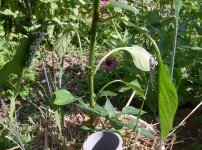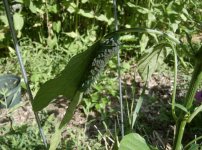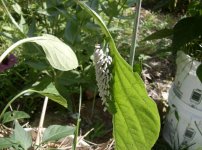I'm not saying she overtly attempts to take credit, I'm saying folks give her credit for things that I have in gardening books from the 1880's.
There is a lot more than what Dr. Ingham is teaching and not everything she says is 100% accurate. In Ingham's soil food web there are many important microorganisms left out, including various types of algae and anaerobic bacteria and no mention of archaea.
Dr. Ingham said humic acids are fungal foods in ACT. Tim Wilson and Tad Hussey setup an experiment to test this and found humic acids actually inhibit microbial growth at fairly low concentrations. The test was repeated several times since, and has gotten the same results.
Her contention of 80% of all biochar being "toxic" is garbage. Also, "toxic" is not clearly defined by her.
Elaine Ingham claims to have reviewed data which showed an unclean brewer after about the second brew will start to breed more anaerobic bacteria then aerobic making the brew counter productive to soil ecology balance and or health. I cannot see how the dissolved O2 content within the compost brewer is decreased in favor of anaerobes simply due to the brewer being less than sterile.
She has conceded several things proven or illustrated by Tim Wilson. One of them is that nematodes do not like a liquid environment and do not multiply in ACT. Her method of testing for CT is not viable for protozoa counts and her units of measure are meaningless (in my opinion) as we do not know the weight of various microbial species. In addition, many of her published fungal photos are clearly dead.
To be clear, we're all indebted to her for what she's done for promoting ACT and organic options for gardeners/farmers for the industry. And I don't have to agree with everything she says to respect her. She has 20 years in a lab, which is highly respectable, but no one is right about everything at all times.
For more research you might read scientists like Marianne Clarholm, Michael Bonkowski, Bryan Griffiths, Vigdis Torsvik, Christa Schleper, David C. Coleman and Jim Deacon. They're not specifically into ACT but are among the world's most respected soil scientists.
There is a lot more than what Dr. Ingham is teaching and not everything she says is 100% accurate. In Ingham's soil food web there are many important microorganisms left out, including various types of algae and anaerobic bacteria and no mention of archaea.
Dr. Ingham said humic acids are fungal foods in ACT. Tim Wilson and Tad Hussey setup an experiment to test this and found humic acids actually inhibit microbial growth at fairly low concentrations. The test was repeated several times since, and has gotten the same results.
Her contention of 80% of all biochar being "toxic" is garbage. Also, "toxic" is not clearly defined by her.
Elaine Ingham claims to have reviewed data which showed an unclean brewer after about the second brew will start to breed more anaerobic bacteria then aerobic making the brew counter productive to soil ecology balance and or health. I cannot see how the dissolved O2 content within the compost brewer is decreased in favor of anaerobes simply due to the brewer being less than sterile.
She has conceded several things proven or illustrated by Tim Wilson. One of them is that nematodes do not like a liquid environment and do not multiply in ACT. Her method of testing for CT is not viable for protozoa counts and her units of measure are meaningless (in my opinion) as we do not know the weight of various microbial species. In addition, many of her published fungal photos are clearly dead.
To be clear, we're all indebted to her for what she's done for promoting ACT and organic options for gardeners/farmers for the industry. And I don't have to agree with everything she says to respect her. She has 20 years in a lab, which is highly respectable, but no one is right about everything at all times.
For more research you might read scientists like Marianne Clarholm, Michael Bonkowski, Bryan Griffiths, Vigdis Torsvik, Christa Schleper, David C. Coleman and Jim Deacon. They're not specifically into ACT but are among the world's most respected soil scientists.










